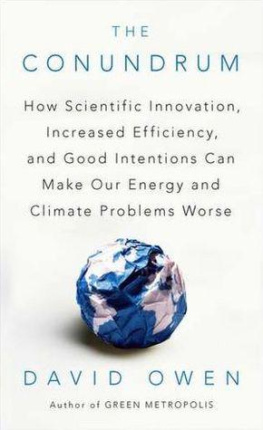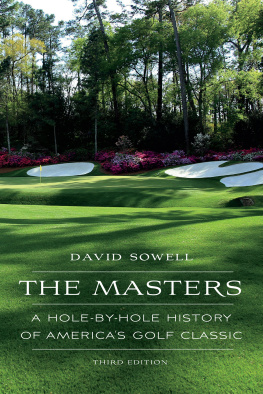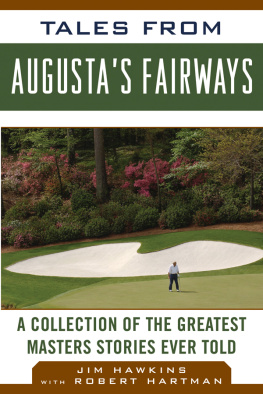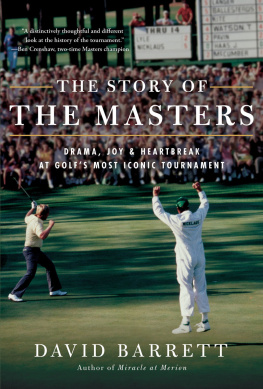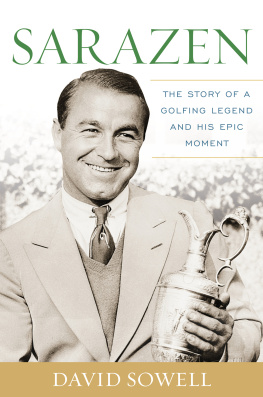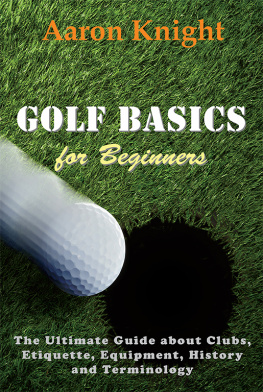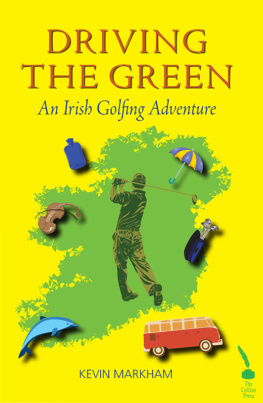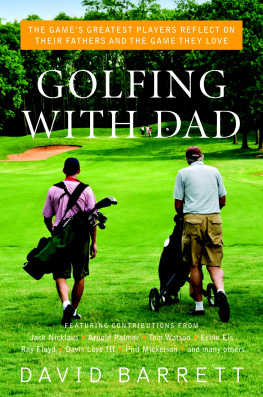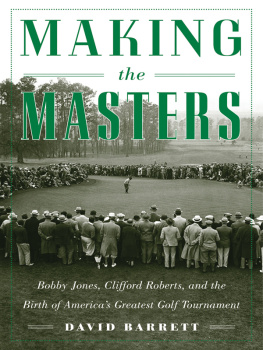David Owen - My Usual Game: Adventures in Golf
Here you can read online David Owen - My Usual Game: Adventures in Golf full text of the book (entire story) in english for free. Download pdf and epub, get meaning, cover and reviews about this ebook. year: 2011, publisher: Crown, genre: Detective and thriller. Description of the work, (preface) as well as reviews are available. Best literature library LitArk.com created for fans of good reading and offers a wide selection of genres:
Romance novel
Science fiction
Adventure
Detective
Science
History
Home and family
Prose
Art
Politics
Computer
Non-fiction
Religion
Business
Children
Humor
Choose a favorite category and find really read worthwhile books. Enjoy immersion in the world of imagination, feel the emotions of the characters or learn something new for yourself, make an fascinating discovery.

- Book:My Usual Game: Adventures in Golf
- Author:
- Publisher:Crown
- Genre:
- Year:2011
- Rating:5 / 5
- Favourites:Add to favourites
- Your mark:
- 100
- 1
- 2
- 3
- 4
- 5
My Usual Game: Adventures in Golf: summary, description and annotation
We offer to read an annotation, description, summary or preface (depends on what the author of the book "My Usual Game: Adventures in Golf" wrote himself). If you haven't found the necessary information about the book — write in the comments, we will try to find it.
My Usual Game: Adventures in Golf — read online for free the complete book (whole text) full work
Below is the text of the book, divided by pages. System saving the place of the last page read, allows you to conveniently read the book "My Usual Game: Adventures in Golf" online for free, without having to search again every time where you left off. Put a bookmark, and you can go to the page where you finished reading at any time.
Font size:
Interval:
Bookmark:
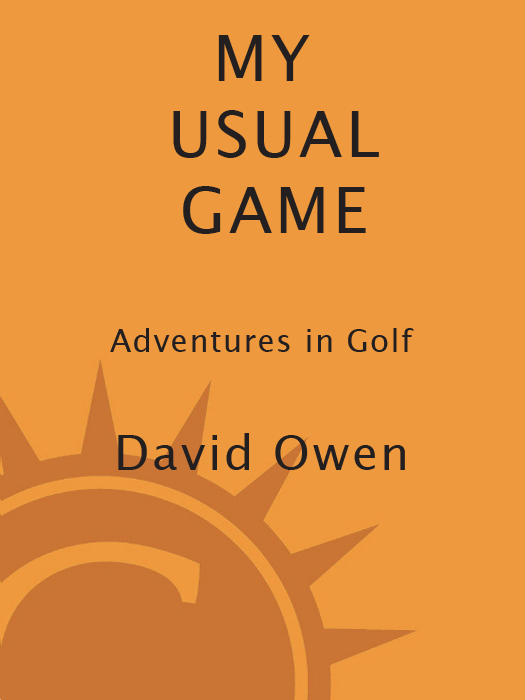
High School
None of the Above
The Man Who Invented Saturday Morning
The Walls Around Us
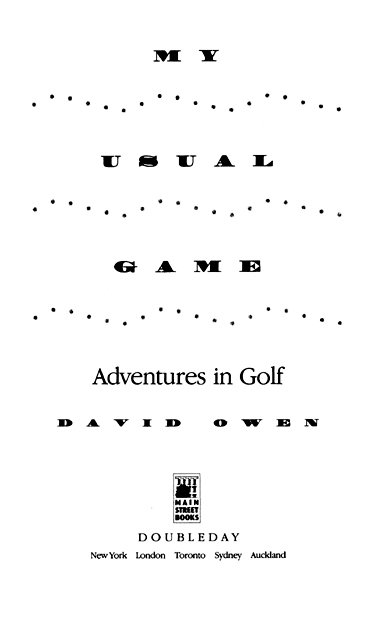
A M AIN S TREET B OOK
PUBLISHED BY DOUBLEDAY
a division of Bantam Doubleday Dell Publishing Group, Inc. 1540 Broadway, New York, New York 10036
M AIN S TREET B OOKS , D OUBLEDAY , and the portrayal of a building with a tree are trademarks of Doubleday, a division of Bantam Doubleday Dell publishing Group, Inc.
Adventures in Golf was previously published in hardcover by Villard Books in 1995. The Main Street Books edition is published by arrangement with Villard Books.
Library of Congress Cataloging-in-Publication Data Applied For
eISBN: 978-0-307-80907-0
Copyright 1995 by David Owen
All Rights Reserved
v3.1
For Ann,
in spite of everything
Just once, I wish I would play my usual game.
Traditional golfing lament


I PLAYED GOLF WHEN I WAS TWELVE AND THIRTEEN, BUT then I stopped. For one thing, I was terrible. For another, it was 1969. Richard Nixon played golf, and Jerry Garcia didnt, and the war in Vietnam seemed not entirely un-golf-related, and so forth. At the age of thirty-six, though, I took it up again. My friend Martha invited me to play one day, and on a whim I went. I shot a humiliating score, but something clicked in my head. The next day, I joined the little nine-hole golf club in the small Connecticut town where I live. I bought shoes, a bag, a glove, and a lot of other stuff. I already had some clubs, an old set that my brother, a good golfer, had abandoned. For a few years, those clubs had been behind a chair in my office, and I had gradually begun to enjoy thinking of myself as the sort of person who just has a bunch of golf stuff lying around. Now, I started playing as often as I could, usually several times a week, a practice I have continued to this day.
I like to start off as soon as its light enough to see. At that time of day, I am almost always the only person on the course, except for the greenkeeper, who lives in a small house just behind the pro shop. He has maintained the course for twenty-five years, and he has become a part of its fabric. Even when I dont see him, I find his spoor: the meandering tracks of his golf cart, his footprints near the sprinkler controls, a pocket of his cigar smoke trapped in the damp air under the trees behind the fourth green. Visible or not, he makes me nervous. He has the third lowest handicap in the club, and he always seems to turn up just before I have to hit a difficult shot. Sitting stiffly in his cart, he looks like an alarmed librarian watching a reader bend back the pages of a book. Sometimes, though, he nods, or makes a slight waving motion with a hose, or offers a curt observation about the weather. One morning, I came within a few inches of sinking a tricky thirty-five-foot putt on the fifth green, near a patch of burned-up grass that he was watering by hand. That was a good putt, that, he said without taking the cigar from his mouth, a comment I view as my highest achievement in the game to date.
When I play early in the morning, the greens are so wet that from a distance they look almost white. A rolling ball kicks up a plume of spray, like a car driving through a flooded parking lot. Greens that in the afternoon will be as hard and fast as bowling lanes are so slow now that I have to muscle the ball to get it near the hole. When I am finished, I can look at the ground and see an exact diagram of my putts preserved in the dew. When I have badly misread a putt, I will sometimes walk back over the line to conceal the evidence with footprints. The diagrams last until the green-keepers sleepy teenage assistants arrive with their mowers and their Walkmans. Eyes half-closed, with steps as slow as elephants, they erase the sad history of my putting one broad stripe at a time, clearing my account, resetting the course to zero.
One of the things I like best about golf is the sense of infinite possibility. Even a lousy golfer will accidentally hit a great shot once or twice in a round. Every so often, Ill sink a long chip, or drop my tee shot three feet from the pin on number three, or hit a gently drawing seven-iron into the green on number six. Other sports are different; I could swing at major-league pitches for the rest of my life and never come close to hitting a home run. But in golf there is always the chance that the next shot, or the one after that, will be terrific. And if it can happen once, why not again? Golf is addicting because it is whimsical. Like a pigeon pecking at a colored disk in a psychology experiment, I keep playing because every so often I am rewarded.
Golf is appealing for other reasons as well. Although a typical round of golf, like a typical baseball game, consists primarily of inactivity, the inactivity is punctuated by moments of tantalizing violence. A golf ball is a big, sleek, slow-motion bullet that you can see, and with the surprising strength of your own body you can send it whizzing perhaps a sixth of a mile away. A golfer is a sniper. Studying a difficult pin placement and selecting the right club from his bag, he is a sharpshooter coolly preparing to pick off the madman who is holding the first grade hostage on the fourteenth green.
Murderous instincts aside, I am a sucker for any activity involving equipment that you have to buy. If I had not become a writer, I could have been happy as an office manager, avidly purchasing case after case of felt-tip pens, correction fluid, paper clips, and staples. I feel the same way about power tools, which have a sleek and titillating loveliness that is distinct from any function. And I feel the same way about golf stuff. I like to buy balls four or five dozen at a time and stack the individual sleeves in neat columns on a shelf in my office directly across from my desk, so that I can look at them while I work. I like to carry a few tees and ball markers in my pocket at all times, even in winter. I like to clean the heads of my clubs with steel wool, a toothbrush, and toothpicks. I like to assemble and arrange my equipment the night before an important match, like an Apache warrior straightening the feathers on his arrows on the eve of battle.
Nongolfers tend not to understand the compulsiveness of those who play compulsively. A friend once asked me, When you say you love golf, do you mean you love being outside on a nice day, or do you actually love the game? I said I did enjoy being outside, but that it was really the game that got my juices going. He said he couldnt understand that. How could anyone get excited about just hitting a ball? He had played golf a few times, he said, and he had liked it well enough, but he could take it or leave it. Soon after our conversation he married a golfer and began to play frequently. A couple of months later, he called me and said, Now I understand what you mean. He had improved to the point where he was able to hit a good shot every once in awhile. When he finished a round now, he said, he found himself thinking anxiously (even compulsively) about when he might be able to begin another.
Font size:
Interval:
Bookmark:
Similar books «My Usual Game: Adventures in Golf»
Look at similar books to My Usual Game: Adventures in Golf. We have selected literature similar in name and meaning in the hope of providing readers with more options to find new, interesting, not yet read works.
Discussion, reviews of the book My Usual Game: Adventures in Golf and just readers' own opinions. Leave your comments, write what you think about the work, its meaning or the main characters. Specify what exactly you liked and what you didn't like, and why you think so.






